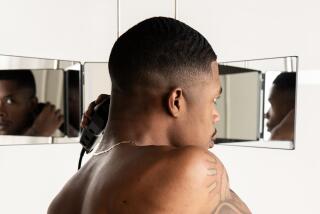Why We Tolerate the Unkindest Cuts
- Share via
You are totally in th e ir hands . . . you can’t believe they would ever do you wrong. I had a guy who fried my hair with horrible perms for years but it took on e real haircut from hell for me to leave and then it was awful because by then we were such friends. --Mimi Bacon, entrepreneur
Intimidated by your hairdresser? Hate your color/cut/perm/style, but afraid to say so? Thinking of changing your phone number/address/job/physical appearance so you can go to someone new?
If you answered yes to any of the above, don’t despair. You may be a wimp but you’re not the only wimp. Beneath the grand hairdos of some powerful and aggressive people are some timid little heads who just can’t say: I HATE THIS.
A professional woman who has taken her hair to the same Los Angeles hairdresser for the last 15 years and has had it cut her way exactly twice has never complained. “Even though it isn’t the way I want it, I know every strand is cut perfectly,” she says. (Like many dissatisfied customers, she requested anonymity for fear of retribution.)
“I have never in my entire life had what I consider to be a good haircut,” says 29-year-old Steve Elzer. “Sure, sure,” says the Fox Broadcasting Co. publicist, “print my name. It doesn’t matter anymore.
“The stylist always smiles and says to me, ‘Well, what do you think?’ and I kind of look at it and think, ‘Oh God, what am I going to do?’ And then I say, ‘Thank you so much’ and leave a nice tip and go home.”
Marc de Coster of Monsieur Marc in Manhattan has counted some of the world’s most famous women among his clients and says he is puzzled by such stories. “Why would you stay if you are not happy?” he wonders.
“The relationship between a woman and her hairdresser,” says de Coster in his heavy French accent, “should be like a marriage. When we meet, it is like our first date. Then later, we are engaged. If all goes well, someday, we marry.” (The bachelor de Coster has “married” many elegant women, including Betsy Bloomingdale and, briefly, Nancy Reagan, but his favorite was Babe Paley. “ ‘The dream of my life,’ I said to her, ‘is to put my hands in your hair.’ ”)
If someone is unhappy with Monsieur’s work, he says, they rarely mention it. But once in a great while, someone may call him at home later and, well, ask for a divorce.
But in the world of hair, there aren’t as many divorces as one might think. Men and women alike get cuts, perms and relaxers from hell, but tip generously, smile and come back for more. Women, because they may be more accustomed to intimidation, may be more likely to let it happen. Men may be more likely to “forgive and forget,” says one Los Angeles physician who did. “It’s only hair. It’ll grow out,” he shrugged after a less-than-perfect cut. “But waiting? I won’t wait. That’s where I draw the line.”
Still some clients are speaking out.
An Orlando, Fla., man recently went to court to talk back to his hairdresser. In a lawsuit against a retail chain’s hair salon, Eric S. Graham claimed that his haircut was so bad he needed psychiatric help to get over it. After letting his hair grow for 2 1/2 years, Graham wanted a trim on the sides only. Instead, he says, he lost 9 inches of hair and with it, his mental health. The suit is pending.
Hair is important. It is sexy and sensual, the face’s crowning glory, the body’s “most visible erogenous zone,” according to Cosmopolitan magazine. It is the body part with the most potential. Fluff it, friz it, slick it, spike it. Change it and you change you.
“You should never complain to hairdressers,” says Hanke Gratteau, a former Chicago columnist. “They can make you ugly.” Hair is emotional. Phyllis Diller, who has lost most of hers and wears wigs everywhere, has added haircutting to her comedy act. “Cutting hair to music on stage is one of the greatest experiences I’ve ever had,” Diller says. “It’s so emotional. The audience goes ‘Oh and ahhh’ as the hair falls away.”
Even for those who preach that women are more than their looks, hair has a certain power. In the early 1970s, Germaine Greer identified underarm hair as “the last frontier” but the outspoken brunette with the fabulous haircut has yet to speak out on the politics, if any, of the hair on her head.
Women’s rights activist Betty Friedan dismissed this reporter’s questions about hair as “frivolous.” But about a year ago, when a hairdresser wanted to give her a “more sophisticated” hairstyle, she had a more serious response.
“Betty really is a wonderful person,” says Frank Dino of Santa Monica’s Wavelengths salon, “but she put me under some duress the whole time I was cutting her hair.”
The more difficulty a man or woman has separating who they are from how they look , the more likely they are to have a troublesome relationship with a hairdresser.
And once they have invested someone with the belief he or she can make them beautiful, some people will put up with just about anything--from waiting long hours to sitting through a hairdresser’s personal phone calls while a lye-based relaxer scalds the scalp.
A pricey stylist in the San Fernando Valley was popular for decades despite a serious drinking problem. “He would start drinking at 9 a.m. so you could be there four hours for a blow-dry,” recalls one observer. “There were a couple clients who would actually go and drag him out of bed in the morning to come in to do their hair.”
Joseph Aguayo of Amadeus in Pasadena worries that, for whatever reasons, some people become their hair. When that happens, he says, an unscrupulous stylist can get away with murder.
Hair can be the battleground for all sorts of power struggles. “We got along fine once we established that the hair on my head was not mine, but his, to do with as he pleased,” says Gratteau, the Chicago columnist.
The pseudo-sexual nature of a woman’s relationship with a male hairdresser can lend another dimension, says Beverly Hills’ Jose Eber, the imposing stylist for such superstars as Elizabeth Taylor, Farrah Fawcett, Tom Selleck and Cher.
“Besides doctors, we are the only ones who touch the person. All of a sudden, you may be very vulnerable, when somebody is touching you, looking at you. All of a sudden, you have no mask. We see the woman with her flaws and her qualities, and she wants to become close to us,” says Eber.
Psychologist Kate Wachs, one of the American Psychological Assn.’s media experts on self-image and founder of Chicago’s Dr. Kate Relationship Center, sees another dynamic to the client-hairdresser relationship. “People tell hairdressers way, way too much about themselves, and that’s what makes it so hard to leave them. They tell them all sorts of secrets and personal things that should rightly be said to a professional therapist.”
“Yes, we play the role of therapist very often,” concedes Eber. “But you know it is important that we have a closeness and a trust. . . . The way you get good results is you trust the person who does you.”
Sometimes, that means letting the stylist have his or her way. “I would never take scissors and chop off someone’s hair without warning them first,” Eber says.
“Really, I hate to violate people. When I decide to change someone’s color, say from blond to red, I always tell them why I am doing it.”


